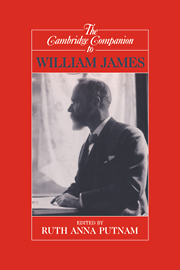Book contents
- Frontmatter
- Introduction
- 1 Pragmatism and introspective psychology
- 2 Consciousness as a pragmatist views it
- 3 John Dewey's naturalization of William James
- 4 James, Clifford, and the scientific conscience
- 5 Religious faith, intellectual responsibility, and romance
- 6 The breathtaking intimacy of the material world
- 7 James, aboutness, and his British critics
- 8 Logical principles and philosophical attitudes
- 9 James's theory of truth
- 10 The James/Royce dispute and the development of Jarnests "solution"
- 11 William James on religious experience
- 12 Interpreting the universe after a social analogy
- 13 Moral philosophy and the development of morality
- 14 Some of life's ideals
- 15 “A shelter of the mind”
- 16 The influence of William James on American culture
- 17 Pragmatism, politics, and the corridor
- 18 James and the Kantian tradition
- Bibliography
- Index
9 - James's theory of truth
Published online by Cambridge University Press: 28 May 2006
- Frontmatter
- Introduction
- 1 Pragmatism and introspective psychology
- 2 Consciousness as a pragmatist views it
- 3 John Dewey's naturalization of William James
- 4 James, Clifford, and the scientific conscience
- 5 Religious faith, intellectual responsibility, and romance
- 6 The breathtaking intimacy of the material world
- 7 James, aboutness, and his British critics
- 8 Logical principles and philosophical attitudes
- 9 James's theory of truth
- 10 The James/Royce dispute and the development of Jarnests "solution"
- 11 William James on religious experience
- 12 Interpreting the universe after a social analogy
- 13 Moral philosophy and the development of morality
- 14 Some of life's ideals
- 15 “A shelter of the mind”
- 16 The influence of William James on American culture
- 17 Pragmatism, politics, and the corridor
- 18 James and the Kantian tradition
- Bibliography
- Index
Summary
The pronouncements on the nature of truth in Pragmatism evoked howls of indignation (e.g., Russell 1945) as well as exaggerated praise. The howls (and some of the praise) came from readers who thought that James identified truth as whatever it gives us “satisfaction” to believe: the critics believed that this amounted to irrationalism, while the enthusiasts thought that the idea that truth is jibing with reality deserves to be abandoned (Rorty 1982), and the Italian pragmatist Giovanni Papini thought that irrationalism is a good thing (Perry 1935, 2:570-9).
The howlers and the enthusiasts were careless readers, however. They virtually ignored what James wrote about truth elsewhere. But it is not easy to say in a few words what James did think about truth, for, as I shall argue, James's view developed in complicated ways as he worked out his metaphysical system. In the present essay, I isolate the elements in James's theory of truth and show how they were linked by James's metaphysics of radical empiricism.
- Type
- Chapter
- Information
- The Cambridge Companion to William James , pp. 166 - 185Publisher: Cambridge University PressPrint publication year: 1997
- 31
- Cited by



